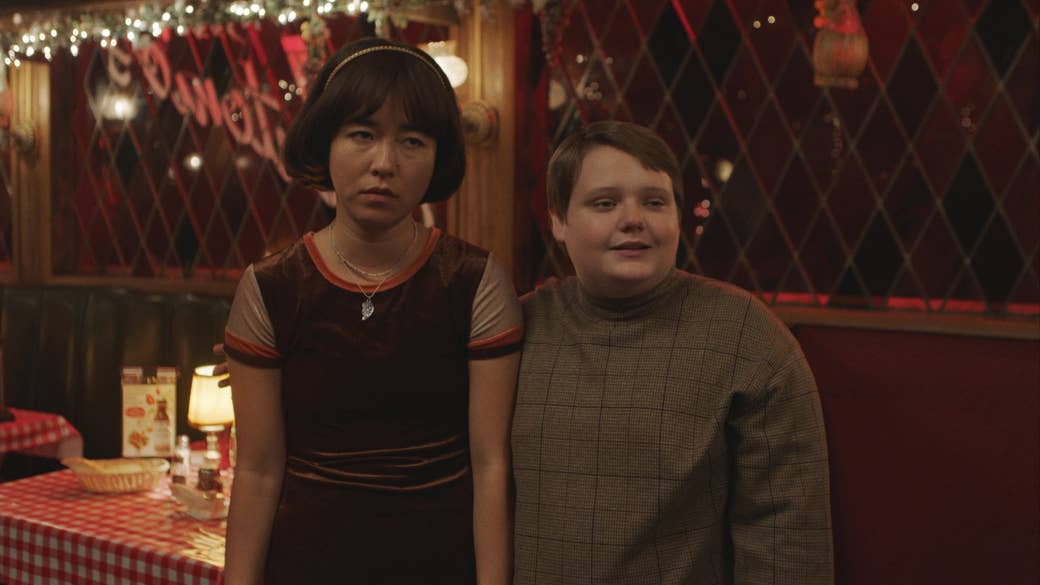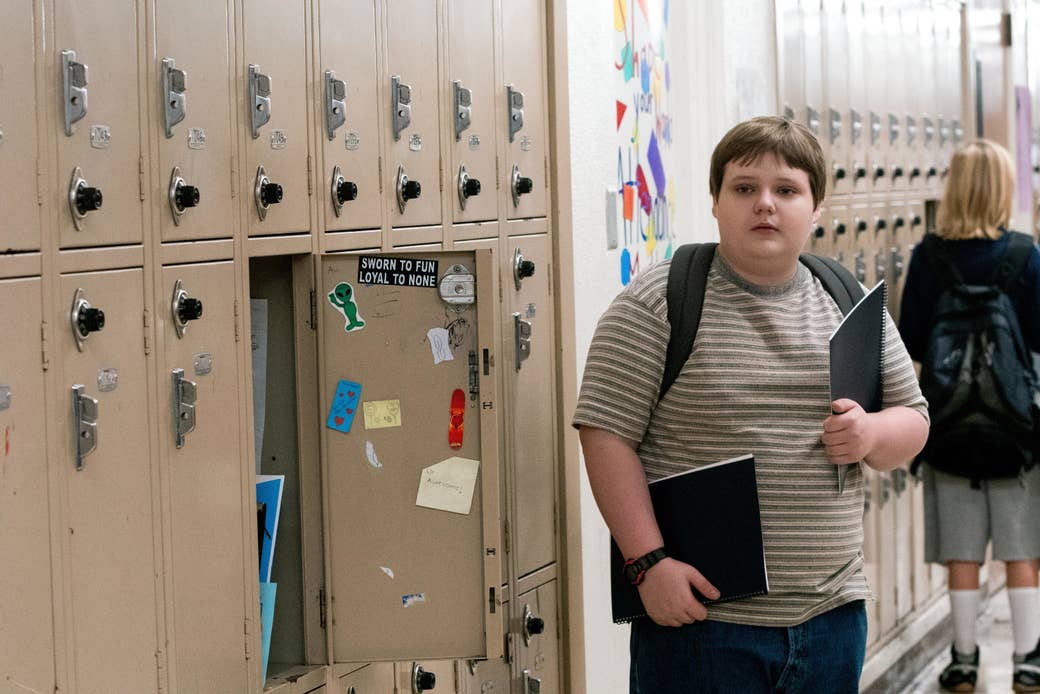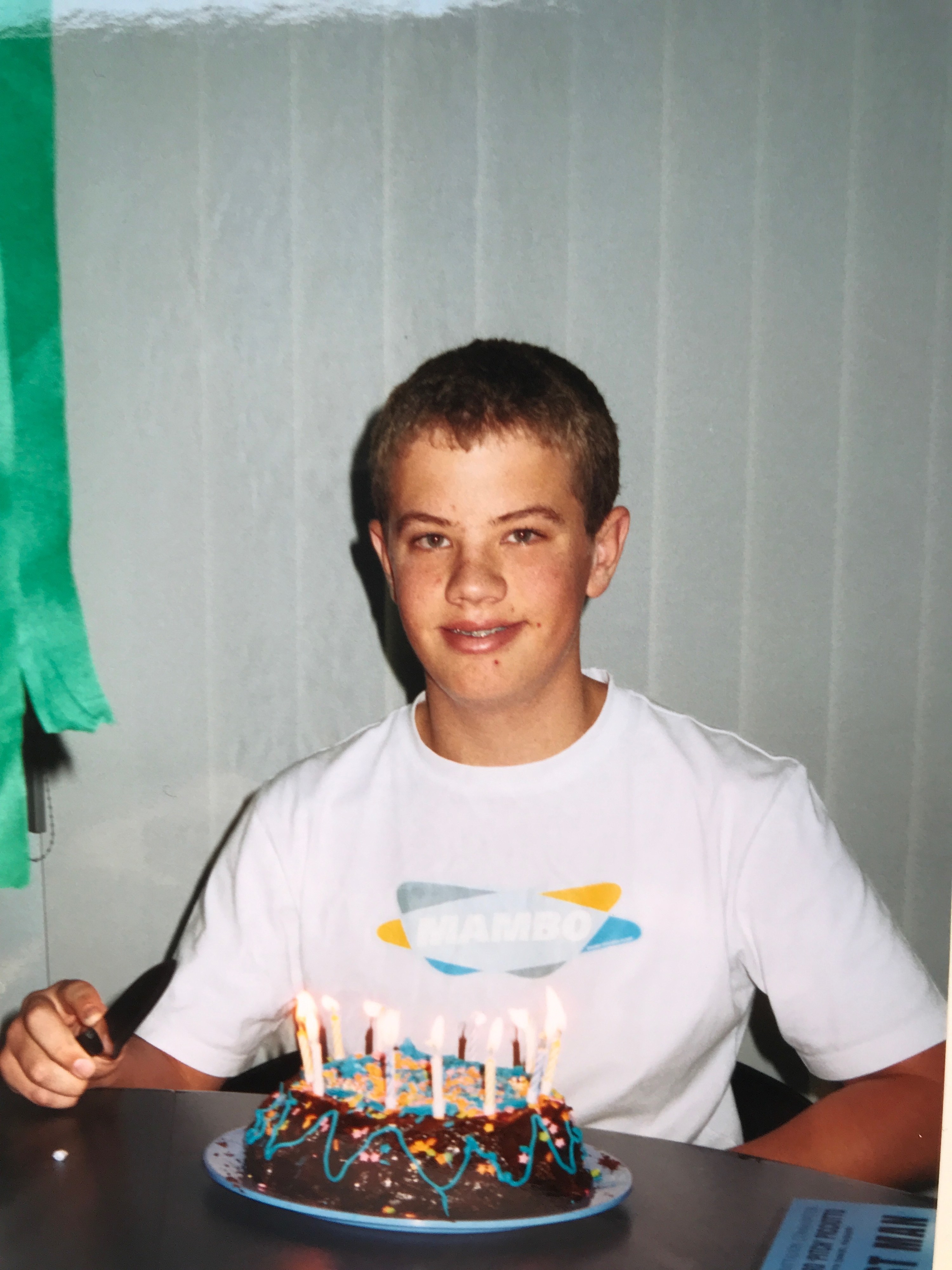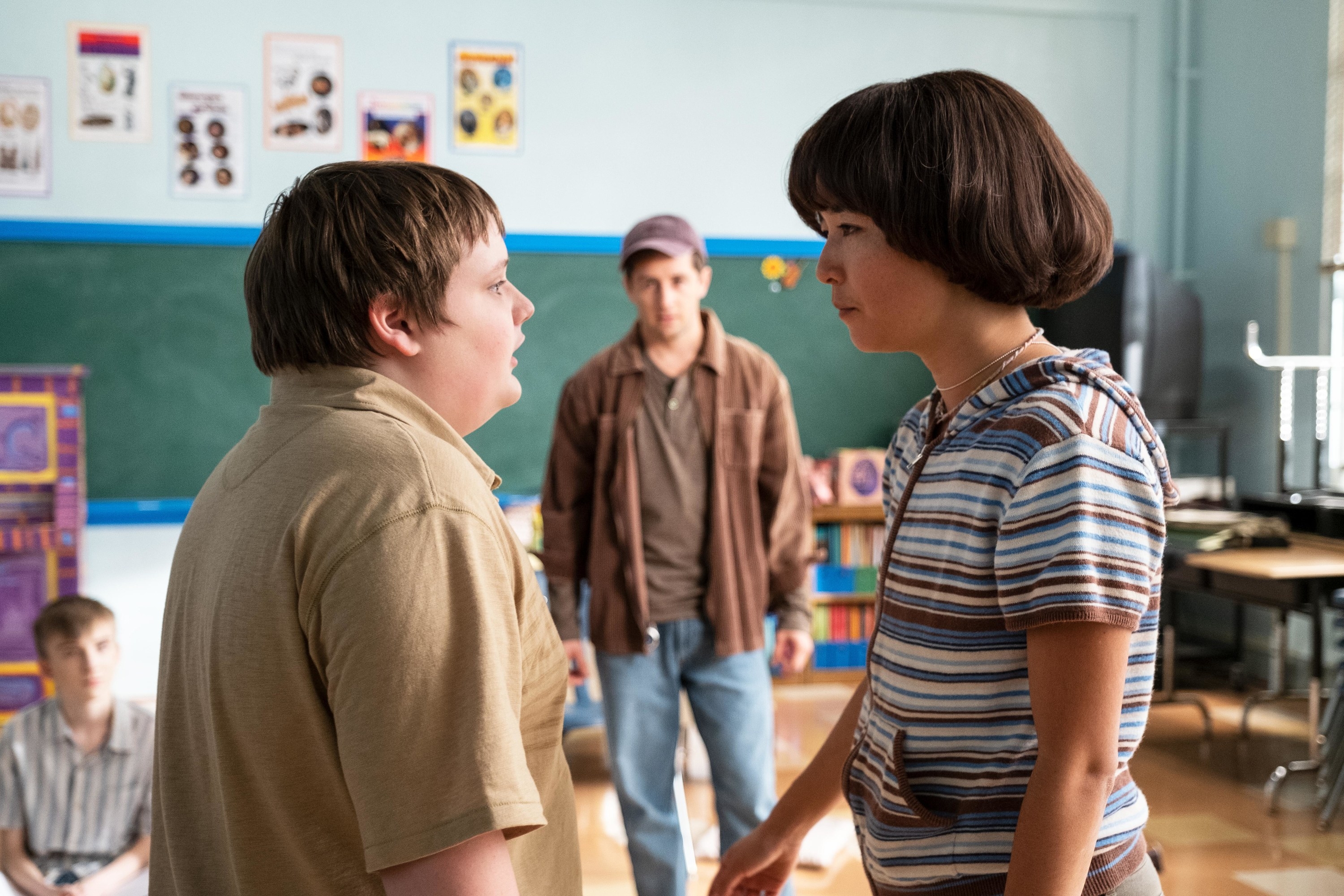
There’s a moment in the final episode of the second season of Hulu’s masterful cringe comedy PEN15 that successfully made me, well, cringe. Then, much later, it left me completely reeling. Maya (Maya Erskine), one of the awkward 13-year-old best friends the show follows, is holding hands with boyfriend Gabe (Dylan Gage) at an afterparty for their school play when she compliments his hair. “Your hair looks different,” she says, shuffling nervously. “It’s hot.”
That word “hot” seems to prompt a Pavlovian response from Gabe, and he jerks his hand away from hers, leaving her silently heartbroken. “Thanks. You too. Your hair is...hot,” he manages to reply, hesitating on that final word as if it were from a foreign language.
A day after I first watched it, I was interviewing another queer man around my age about the scene and he recalled similarly freaking out at the advances of a girl when he was young. He recounted going to a school dance and then running away — literally running away — when a girl tried to grind on him. “Oh my god,” I interrupted. “The exact same thing happened to me.”
I haven’t thought about that year 8 dance in what feels like centuries. I guess I quite literally blocked the experience out of my mind. But then suddenly it came rushing back: The sheer horror I felt as a young girl approached me amid the multicolored lights of the teen disco our mothers had driven us to, touched me on the arm, and asked me to dance. It wasn’t an absurd question — we were there to dance, after all, and a couple of my friends had already peeled off with some of hers — but her touch sent me into a panic. I made a hurried excuse about needing to use the bathroom and left. While the rest of the night is a fog, during that interview I could suddenly recall the fear I had felt as she approached in vivid detail. What did she want from me? What exactly did she think I was going to do in return?
When PEN15 premiered in 2019, it won deserved praise for the unbelievably accurate verisimilitude of the middle school experience for kids in the early 2000s. Erskine and Anna Konkle (Anna) — the show’s creators, along with Sam Zvibleman — play 13-year-old versions of themselves surrounded by actual child actors wearing puka shell necklaces and plastic butterfly clips (that I shudder to inform you are now considered period costumes). The contrast of Erskine and Konkle’s size in relation to the real kids on the show perfectly captures the awkwardness of puberty when bodies seem to look and feel weird. The show also nails the big, formative moments — say, stumbling into masturbation as if it were a secret activity you had invented — and the impossibly small minutiae I was convinced only I had experienced (e.g., deeply regretting inviting your best friend to sleep over after watching them, with silently building fury, get along better with your own family than you).
But the second season, which debuted on Hulu last week, features one of the most accurate and sensitive portrayals of a young boy grappling with his burgeoning sexuality that I’ve ever seen on television, let alone in a comedy. While Gabe’s story is a B plot — it is a show still centered on Maya and Anna, after all — it is captured with such nuance and precision that I felt like I was watching my younger self onscreen.
And I’m not alone.
“It’s representation I never thought I would find or even think of seeing at all,” said Sam Marvin, the guy whose anecdote about running away at his dance made me recall my own buried trauma. The 29-year-old café and florist worker in Brooklyn attended a small coastal school in Oregon and vividly recalls being the shy, overweight kid in a school play who, just like Gabe, ever so slowly realized he was not like the other boys.
“It’s a funny little period of my life,” he told me over the phone while taking a break from quite literally cleaning out his closet. “And it’s so funny to see it onscreen.”

Part of what makes the PEN15 handling of Gabe’s story so perfect is the age at which he is beginning to question himself. Gabe is much younger and chubbier than the handsome but closeted high school boys from Love, Simon (2018) and Hulu’s TV spinoff Love, Victor, who remain endearingly cute as they nervously flirt with other boys and seek love. Unlike Noah Galvin’s character in the ABC sitcom The Real O’Neals (2016–17), Gabe hasn’t even fully realized that he’s gay. He knows he has a secret, something he’s ashamed of — he just doesn’t know exactly what that is yet.
“Some of his friends haven’t even kissed a girl yet and he’s realizing he’s gay. There’s just this really relatable sadness to it,” said my friend Andy Stone, the 33-year-old marketing director for Tushy in New York City whose tweet formed the genesis for this story.
“He’s probably going to be struggling with this for a while and it’s not going to get wrapped up neatly with a bow,” Stone said. “He’s not going to get a boyfriend at the end of the next episode — especially when you think about when this is taking place. Maybe it’d be different if this were a show taking place in 2020 as opposed to 20 years ago.”
Much of Gabe’s storyline came from PEN15 writer Josh Levine, 41, who went to middle school in Orlando in the 1990s and drew upon his childhood confusion for this season. “I’m very happy that nowadays there are very many ways that kids who are questioning their sexuality can see wonderful positive role models across the media platforms,” he told me over Zoom from his Los Angeles home, “but we didn’t have that.”
“Those middle years were so difficult for me and for a lot of other people because you’re literally in between two phases of life: adolescence and the teenage years,” he said. “You’re really lost. You’re really trying to get through.”
Gabe, Maya, Anna, and the rest of the kids on the show are at that key transitional age, watching their childhood get slowly disassembled as they stare down the barrel of becoming a teen and later a grown-up with both excitement and nervous terror. There’s no handbook for how they’re supposed to act so they just all sort of muddle through. “That’s why PEN15 is really good,” said Cole Bubenik, a 27-year-old content marketer in Austin who told me he also saw himself reflected in Gabe. “Even the girls aren’t really into boys or sexuality yet. They’re just wanting to be kids for a while longer. They’re sort of play-acting as adults.”
I was so affected by Dylan’s portrayal of Gabe that I wanted to tell him what it meant to queer men my age. At 14 years old, Dylan is just starting online classes for the ninth grade in Atlanta, and he told me he’s been moved by the responses from the LGBTQ community to his character. “I’m just super-duper thankful that they see themselves in me,” he said. “I think that’s awesome.”

Of course, when I was in grade school in the late 1990s — or primary school, as we call it in my native Australia — I involved myself in the ongoing saga of who liked whom. I remember nervously calling the home of the most popular girl whom we all were infatuated with (an original choice, I know) and hanging up in a panic when her mother answered the phone. The revolving cycle of crushes in our class was a delicious soap opera that we were all writing for ourselves and it felt so adult.
But then — very suddenly and without warning — it became too adult. As we aged into our next schools and teen years, childish talk of Spin the Bottle and gossip on MSN Messenger (our version of AIM) was suddenly being infiltrated by grown-up words like “fingering” and “hand job,” which left me recoiling at hand-related imagery I didn’t quite understand. Girls were no longer just cute, I was informed; they were hot. “I’d fuck her,” I remember hearing pubescent boys at my school assert proudly with all the faux machismo a 13-year-old can muster.
I didn’t get why we couldn’t be kids a little while longer. It all felt so fraudulent, so fake, like everyone was pretending to be older than they were. And I was left feeling resentful and like I was being left behind. Then, ever so slowly, it dawned on me. There had been a fork in the road that I hadn’t noticed. I wasn’t just being left behind; I was on a different path entirely.
In PEN15, Gabe seems perfectly happy to continue being a kid. A collection of Animorphs books lies behind his bed, and he stays up late working on the hand-drawn magazine he and his friends are making about weasels. “You guys have to grow up,” Anna scoffs at Gabe and his friends at a pool party as they flip through Weasels. “Do you think this is going to fly in eighth grade? You have to be more mature!”
By the end of the season, Gabe is quite literally play-acting as an adult opposite Maya in a hilariously inappropriate school play about a turbulent marriage written by their drama teacher. But he’d spent most of the rehearsal period, and then ultimately the play itself, coming up with excuses to avoid a kissing scene with Maya. When the curtains open, he and Maya are in makeup designed to make them look older and fighting about his character’s wandering attentions and inability to please her sexually in rough 1950s Brooklyn accents. (Please remember these children are 13.)
I, too, was a theater kid (surprise!) and still remember the laughably adult scene a girl and I devised for our after school drama class about a bitter marital fight. We were 12 or 13 and even though our short sketch showed a failing marriage (my character had spent a surprise inheritance on a motorcycle — the cad!) I still felt drawn to it as if it were a role I knew deep down I’d be playing for the rest of my life.
Eventually, of course, reality becomes unavoidable, and you realize the feeling you had watching the 1994 kids football movie Little Giants on VHS was not about wanting to be ‘90s teen heartthrob Devon Sawa but about wanting to be with Devon Sawa. Some gay boys get it walking down the underwear aisle in stores and finding excuses to double back and steal more glances. Others get it watching Chris O’Donnell in 1997’s Batman & Robin (OK, these were both me, too).
And for Gabe, that moment comes when he and best friend Sam (Taj Cross) watch a cheesy softcore porno together during a sleepover. “What’s the farthest you’ve gone?” Sam asks as they watch.
“Haven’t found the lucky lady,” Gabe replies stiltedly but without hesitation, as if he’d been practicing the answer all his life.
As they continue watching the after-dark Cinemax programming, Gabe’s attention is suddenly piqued by the arrival of a muscled man rubbing a rose on a woman’s lingerie, kissing her neck, caressing her back. As the camera zooms in tight on his face, orchestral music swells like it's the end of The Lord of the Rings and Gabe closes his eyes in a flush of ecstasy. It’s his first moment of sexual awakening — and the face he imagines kissing when he closes his eyes is his friend Sam’s.
So much of Gabe’s quietest but most telling moments involve close-ups of his face, as he winces when friends use “gay” to mean “uncool” or the sting he feels when Sam leaves him to hang out with a cooler crowd. Gabe’s crush on Sam confuses him and is partly because Sam is more confident and handsome than him. But mostly it’s because he’s nice to him.
This confusion is again deeply relatable. Marvin, the Brooklyn café and florist worker, told me he remembers falling for his best friend in middle school. “My mom told me recently that I got upset when he had a girlfriend,” he recalled. “She said, ‘That was when I knew you were gay. I could see it in your face. It was a sadness.’”
Like many his age, Gabe tries to understand himself through contrasts with the other boys in his class. He’s not as outgoing or sporty as Sam, but he’s also not as outwardly effeminate as Ian (Ivan Mallon), the other boy in the school play whom the popular kids choose as Class Gossip in their superlatives contest because he presents more evidently as gay. So where does Gabe fit?

All the boys on the show are navigating masculinity for the first time and their attempts at doing so lead to them being endlessly cruel to one another. When a friend calls Gabe and Sam “homos” for watching porn together, Gabe responds with mock bravado by calling him a “faggot.” The word hangs in the air for a split second as all the boys contemplate the grenade. The camera shows Ian looking slightly disappointed in Gabe, and Gabe looking disappointed in himself.
Stone, the Tushy marketing director, told me that for him that painful scene mirrored the way Maya and Anna channel their self-hate at their mothers in another episode. “You’re seeing Gabe do the exact same thing and using hateful language even though he doesn’t hate Ian. He doesn’t hate gay people,” said Stone. “He just hates this idea of what he’s going through and what it could cost him with his relationships with his friends.”
More than anything, though, the boys are mean to the girls — especially Maya, the most vulnerable. Like sharks smelling blood, Sam calls her a cruel nickname during their wrestling match, while Ian votes to exclude her from the play because she’s talentless. Both later feel varying degrees of remorse.
Gabe’s hurting of Maya is less intentionally cruel but just as devastating. He inflicts enormous pain and confusion on her by leading her along in their faux relationship. “I think that was the first relationship Gabe has ever had,” Dylan Gage told me. “It was him trying the hardest he could and deep down he’s like, OK, if I can do this, I’m going to try it and maybe I can do it and maybe I can be normal, but I think that starts to slowly fall apart.”
After a truly agonizing “kiss” on her chin, Gabe finally admits to Maya he doesn’t feel the same “butterflies” as she does. “It’s not you. It’s —” he tells her, unable to finish his thought. “I’m just trying to be honest.”
The rejection is shattering for Maya, leading her to once again question her beauty and self-worth. But Levine, the writer, said it’s clear Gabe is never coded as a villain like Maura (Ashlee Grubbs), the interloping friend who tries to break up Anna and Maya. “When he begins this relationship, he has no idea that he's going down a road where he’s actually going to hurt her, where his own confusion ends up hurting her,” Levine said.
The scene made Levine recall the weeklong relationships he forced with girls when he was a kid, feeling pressured to play the part. “I even met one girl’s dad one day and he was so nice, and I remember feeling so guilty,” Levine recalled. “I didn’t know what I was yet, but I knew that I was lying and that made me feel so terrible.”
Everyone in middle school, and in PEN15, is so caught up in their own pain, their own self-inflicted trauma, that they can barely notice anyone else’s. When Gabe ends things with Maya, it’s not because he’s suddenly accepted himself and is ready for some big Hollywood moment with a boy. We know the rest of middle school will probably be just as awful for him, not to mention high school. And just like Maya, he’s probably going to hate himself for a long time to come. After all, kids can be mean to each other, but deep down they’re the meanest to themselves.
The path I found myself on after unknowingly diverging from my friends was painfully dark for several years. There was bullying, of course, but mostly an overwhelming sense of loneliness. Don’t get me wrong, I had friends — dear friends who I still speak to today — but school is awful when you never fully get the chance to be yourself, when you’re always holding back. Watching Gabe, I remembered the fear I felt when I was in his shoes — the sense that I was fighting an unwinnable battle all by myself.
But, of course, I wasn’t really. Talking with the other men for this story, we laughed at each other’s tales of awkward dates, dances, and first kisses with girls. We recognized ourselves not just in Gabe but in each other. We had followed the path, and it had led somewhere beautiful. ●
